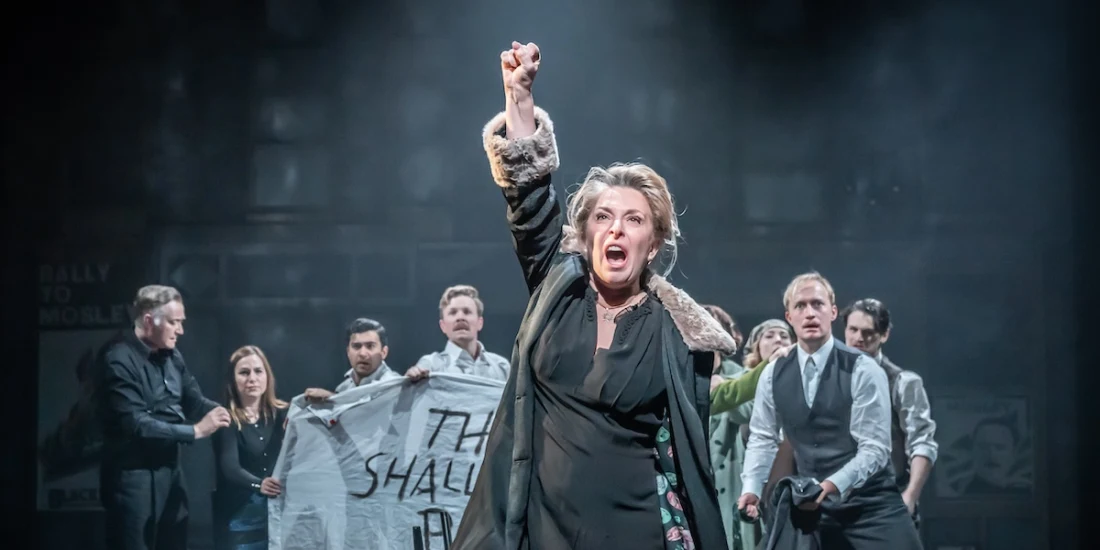'The Merchant of Venice 1936' review – Tracy-Ann Oberman battles fascism in this urgent, inspired update
Read our review of The Merchant of Venice 1936, now in performances at the Criterion Theatre to 23 March.
Tracy-Ann Oberman has confessed that, as a child, she hated Shakespeare’s play and its depiction of Shylock the Jewish moneylender. But she has remarkably reclaimed it in The Merchant of Venice 1936, an inspired reworking that transfers the action to 1930s London – and, tragically, its climactic passionate plea for tolerance and solidarity only feels more crucial thanks to recent events.
Oberman has based her Shylock on her great-grandmother, Annie, who fled Belarus and made a new life in the East End – only to become the target of antisemitic hatred once again via Oswald Moseley and his fascist Blackshirts.
For the most part, Oberman and director Brigid Larmour’s use of the 1930s setting works extremely well (this production previously toured the UK last year). They have judiciously trimmed the play, and added an opening Hebrew blessing to establish Shylock’s household, but otherwise it’s all in the context: Antonio becomes a Blackshirt, his friends are prejudiced toffs, and Portia is a dead ringer for Moseley’s wife Diana Mitford.
But lines jump out you with this new framing – like Portia’s rejection of a Moroccan suitor with “the complexion of a devil”. Shylock’s daughter Jessica is styled as a schoolgirl, making her flight with Lorenzo feel more like grooming than romance, but she is still out by his viciously snobbish friends because of her Jewish heritage.
Though Oberman’s Mitteleuropean-accented Shylock is no pushover, you feel the threat much more overtly when Antonio looms over her and sneers that he will spit on her in the street. You also readily believe Shylock when she says that she’s only executing the villainy that she’s been taught by others.
Oberman gives a riveting central performance: partly savvy survivor, who revels in her prowess as a deal-maker, partly terrorised woman who exhibits real anguish when Jessica betrays her, and who is left completely isolated by a corrupt system, with just her burning vengeance to sustain her.
Hannah Morrish is excellent too as a sardonic socialite Portia, who charms us with her wit, then shocks us with her utterly merciless treatment of Shylock in court – especially her crowing use of the word “alien”. Jessica Dennis is memorably venomous as Shylock’s turncoat servant, Mary, nastily mocking her former employer along with a racist policeman.
Raymond Coulthard is an icy Antonio, who only thaws when in the presence of his beloved Bassanio. We first meet them in their privileged members’ club, champagne and cigars in hand. Xavier Starr is effective as a Bullingdon-esque Gratiano, a drunken thug who, while draped in a Union Jack, pisses on the doorstep of a Jewish house.
That presages an escalating campaign of intimidation. We hear breaking glass and screams, and see Shylock’s building transformed via boarded-up windows and horrifying graffiti (noir-ish atmospheric design by Liz Cooke). Projections show us the real history: Moseley’s Blackshirts on the march, along with their vile antisemitic quotes.
Unfortunately the ending doesn’t fit at all, as we lurch from Shylock’s downfall to suddenly her East End neighbours standing up for the Jewish community during the Battle of Cable Street. It’s a shame their camaraderie isn’t seeded earlier, so that it makes dramatic sense. Likewise, Portia’s subplots involving caskets and rings, which are always pretty silly, now seem nonsensical by comparison.
But, given the number of gasps I heard at dark plot twists like Shylock’s forced conversion, Oberman has brought plenty of new audiences to Shakespeare and made a problematic play feel accessible and urgent. She also makes us face our own history – and entreats us not to repeat it.
The Merchant of Venice 1936 is at the Criterion Theatre through 23 March. Book The Merchant of Venice 1936 tickets on London Theatre.
Photo credit: The Merchant of Venice 1936 (Photo by Marc Brenner)
Originally published on

